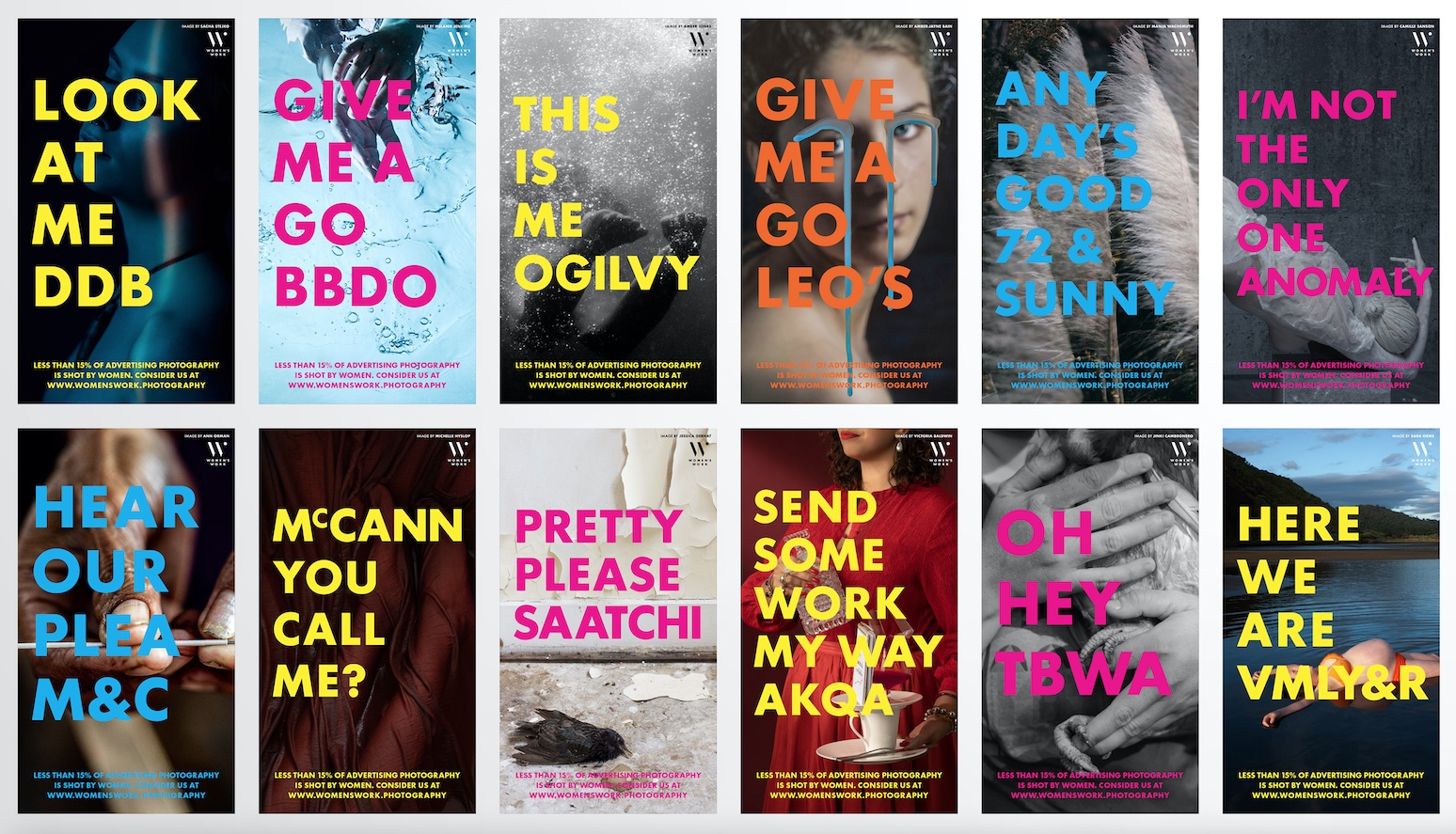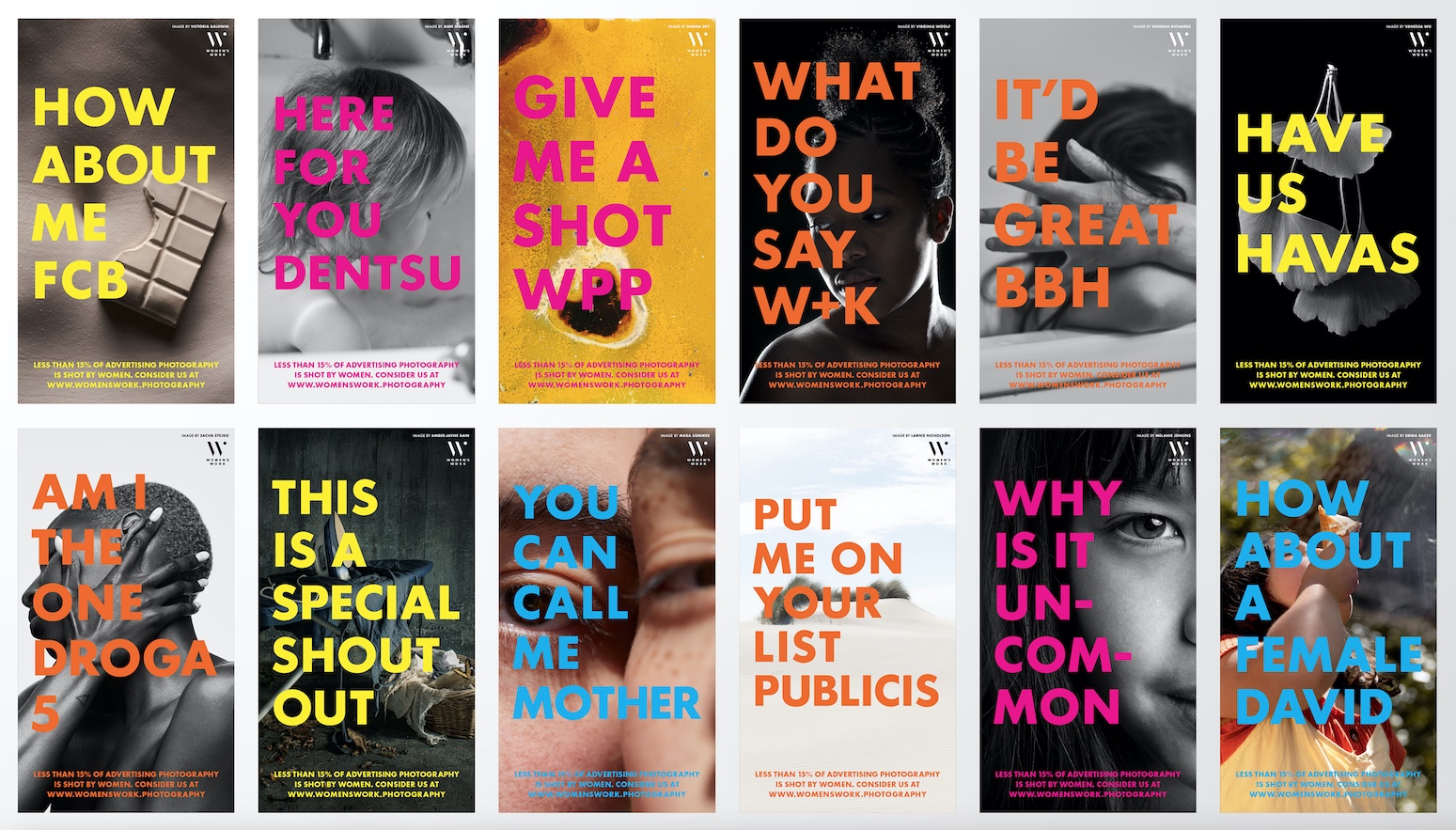Women’s Work Collective and Saatchi & Saatchi New Zealand enter Cannes Lions with a case study of a campaign that never ran
Women’s Work, a collective of women New Zealand photographers, admit that you won’t have seen their campaign before seeing their case study – because frankly, it never ran.
It may sound nonsensical, however it’s a calculated approach to get the Collective’s challenging message directly in the faces of advertising agencies and their creative departments.
The case study film features the previously unseen campaign of 24 posters that highlight the disturbing fact that of all the photography used in advertising less than 15% is shot by women.
It then goes further by calling out agencies, asking them to start deliberately and consciously put women photographers on their shortlists for future projects.

Says Victoria Baldwin, creative director, Women’s Work: “We’ve calculated that less than 15% of photographers in advertising are women. But realistically, the percentage globally is probably less than half that.
“We asked Saatchi & Saatchi to help promote our talented New Zealand women photographers. They however suggested going bigger by using this opportunity to highlight this global issue of unconscious bias to the world, and so The Case Study Project was born.”

Says Steve Cochran, CCO at Saatchi & Saatchi New Zealand, Women’s Work’s partner agency: “Our deliberate and transparent ambition for this campaign is to enter into Cannes Lions International Festival of Creativity in order to get our message directly in front of the creative community’s most influential leaders. In, what might sound very meta, our case study about our ads is actually our ad.
“Some might say creating a case study about ads that never ran to enter into an award show is a bit cynical or bending rules. But we think there’s poetic irony in using an unseen advertising campaign featuring women’s photography to highlight that fact women’s photography in advertising is just that – relatively unseen.
Says Kristal Knight, CD at Saatchi & Saatchi New Zealand: “Our global CCO, Kate Stanners, has advocated for all Saatchi & Saatchi offices around the world to make women a consideration on any pitch list, both photographers and directors.
“So The Case Study Project is about challenging ourselves and every other agency to do that. Yes, we’ve called out numerous globally renowned agencies with a blatant shot-gun approach to purely get attention and provoke – but what we are really looking to do here is to create real, tangible change.”
The Case Study Project has been released online before the Cannes cut-off deadline to make sure it qualifies as a piece of work in itself.
More information about Women’s Work and links to their photographers can be found on their website www.womenswork.photography.

16 Comments
Love the campaign and will push our clients harder to choose female talent.
Smart. Like it. Good stuff team.
Nice
Sorry team, especially the ladies, but this is all sorts of BS. All but strong arming a jury to award this creative team a lion, on the basis that the work will reach “hundreds of thousands” more people and solve the problem is desperate and just not true. I’d be fine if it was done as a laugh – I’d probably applaud it. But said with a straight face, it honestly made me embarrassed. Kinda like claiming this is the most “meta case study” the world has ever seen, especially knowing we’ve all seen ideas that use the same (direct to the juror) technique over the years. But I suppose since you told me it’s awesome, it must be.
It’ll have the worlds most influential creative leaders think about female representation in photography. It’s beautiful. It’s important. Love it.
Totally agree.
This direct to juror technique is very far from fresh, no matter how good the cause.
I think it’s smart.
The judges decision making, influence, impact and campaigns they oversee reach “hundreds of thousands” every single day. Good stuff. Wait…am I now in the campaign?
Too bad the ryhmey type is all over the photography it is trying to sell. Anti-meta perhaps?
Isn’t that an Elvis song?
Err…have you ever judged at Cannes or any major show? Literally every case submitted is a desperate plea for judges to like it and make sure it’s shared with hundreds of thousands more around the world.
How is the other work more worthy of that audience than this in your mind?
I’m sure the judges will have exactly the debate this work is asking for. They’ll probably not award it anything but it will almost certainly prove to be effective if the PR is right. Thennext year Saatchis can go again and win something big.
It’s a great idea and it’s already working.
Is this hack of our industry is apparently more interesting than the most culturally significant work our industry has ever done #notamotionsicknessguy
They’ve calculated that it’s less than 15%. I don’t know how they’ve done their calculations, but I did some calculations of my own, based only on credits I could find online, and found that from recent Saatchi NZ campaigns they have used 100% male photographers.
Now, I’m sure this can’t be true, being such advocates of female photographers, but their big award-winning Toyota campaign was shot by Ross Brown. Maybe they considered a woman, because that’s all their global CCO wants, but then decided that shooting cars was more suited to a guy? I dunno.
Chorus OOH and print seems to be type only, so no one wins there. And other recent campaigns (like Nestle) don’t give credits for a photographer – which is a shame if it happened to be a woman because they could really do with a bit of a leg up.
Well, I’m sure their next campaign or two will feature female photographers (because you have to when you do a campaign like this), but once Cannes comes and goes, well, they’ll still be “considered.”
Weird that the posters make the photography unrecognisable, when that’s what they are trying to sell.
Did you know that of that 15% only 3% are Maori? So if you don’t give this gold then you not only against women, but you’re also against minorities.
A lovely idea. I wish they were a bit more subtle about asking for it to be awarded. But it’s a lovely idea.